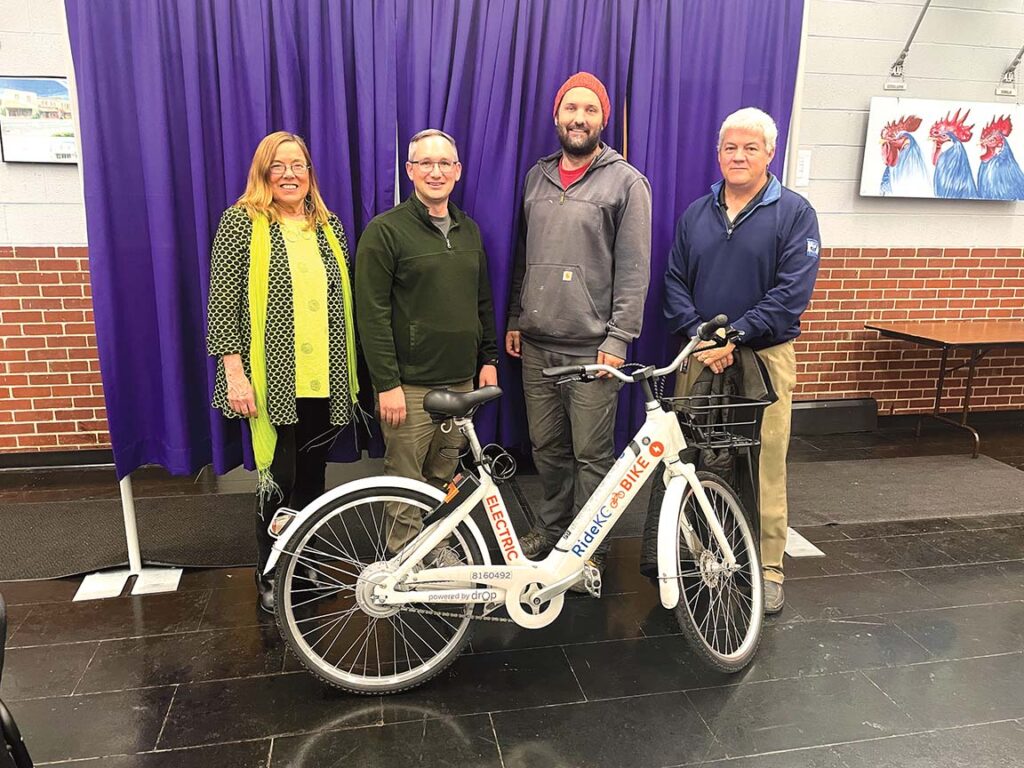
Abby Hoover
Managing Editor
RideKC Bikes installed its first Northeast hub earlier this month at Independence and Woodland avenues through a new partnership with Independence Avenue CID, Kansas City University, and Jerusalem Farm. The new hub location features a first-of-its-kind electric-assist bike model that operates in a hybrid “dockless” format.
The RideKC Bike system allows users to scan a bike to check it out, ride it safely, and then return it at any authorized hub location. Every bike has both a cable lock that wraps around a fixed object, and a wheel lock that automatically closes through the rear wheel, ensuring responsible parking. Bikes are one dollar to unlock and 15 cents per minute.
“As many of us remember, it was actually a year ago tomorrow that we took this request to partner with the university, with Jerusalem Farm, to Eric,” said Bobbi Baker-Hughes, manager of the Independence Avenue Community Improvement District (CID).
The new station can be stocked with up to 10 bikes at a time.
“Thank you to all of your organizations for making it happen, I think getting you all on board was the quick part of the process,” said Eric Vaughan, director of RideKC Bike. “The university, CID and Jerusalem Farm all were very quick to say, ‘Yes, this is a program and a partnership that’s worthwhile for the neighborhood,’ and so the long part was just the city approvals, which, for some strange reason, took longer than any approval process we’ve had before.”
Once they had the approval, Jerusalem Farm worked with the University to get a concrete pad ready to go, which Vaughan said was definitely the quickest site prep he’s ever been a part of. After that, the bike rack was installed and the bikes were delivered to their first Northeast location.
“It is super cool. Today I saw where three or four bikes were out and running already this morning,” Baker-Hughes said. “It’s really fun to see people out on them, knowing that many of them are university students, and they’ll start to really take a better, closer look at our neighborhoods and our businesses. They’ll now explore, discover and experience the international marketplace.”
RideKC’s bike share program began in 2012. At that time, Northeast was identified as a high priority neighborhood.
“We’re just extremely excited to finally be here,” Vaughan said. “But it’s also a great thing for the neighborhood. We have 47 hubs throughout Kansas City, Missouri, and about 90 total throughout the metro, all the way from Lenexa, Johnson County, to North Kansas City, and throughout KCMO, obviously.”
Vaughan said the latest installation will connect this neighborhood to a larger community.
“We’re tearing down some of those jurisdictional boundaries so that anybody with one of our bikes can flow wherever they need to go and get to their destination,” Vaughan said.
Baker-Hughes is excited for the potential of additional hubs on Independence Avenue, and business owners have already begun working on adding bike parking on their properties.
“It’s a great incentive for other businesses in the neighborhood to put in bike parking,” Vaughan said. “Just having one bike rack at their business now will really open up the possibility of where people can take and utilize them.”
The total cost for a “pedal-assist” electric bike like the ones found at the RideKC hubs is around $3,000 initially, plus $1,500 per bike per year in operations. They do apply for grant funding, which helps offset some of the costs.
To use a bike, riders should download the RideKC Bike app.
“Through that app, you can find all the locations where the bikes are in real time and use that to check the bike out,” Vaughan said. “As soon as the bike is checked out, the lock will unlock and it’s ready to ride.”
“You have to pedal to get the boost, there’s no button to push to make the motor go,” Vaughan said. “But as soon as you start pedaling, they will sense that, and give you a nice little assistance boost to help conquer some of our Kansas City hills. I call it ‘no sweat’ biking.”
RideKC Bike has a crew out seven days a week maintaining, repairing and cleaning the bikes.
“Since the pandemic, we’ve upgraded all of our sanitizing procedures, so every time our staff touches a bike, it’s being sanitized,” Vaughan said.
Baker-Hughes presented Vaughan with a check for a portion of their three-year commitment of $4,000 per year and thanked the partners working on the Avenue.
“We’re just appreciative of both of our partners and RideKC for making this happen, and it’s been something that we’ve been wanting to bring to the Northeast, just furthering accessibility for people,” said Jordan Schiele, Project Director at Jerusalem Farm. “I know in our area we have high concentrations of people without vehicles and so trying to think about ways that we can provide other modes of transportation around the city.”
Walk-up users are charged 15 cents per minute. Annual memberships are $149 per year, and allow 80 minutes of ride time per day on any RideKC bike throughout the metro.
“My family’s avid users of these bikes, which is why we’re personally also motivated because we’re connected now to a larger network,” Schiele said. “We ride it downtown, you stop somewhere, you stop your trip, and then you can hop on a bike and your time picks back up. It’s a good amount of time to travel around the city, 80 minutes.”
As an equity partner, Jerusalem Farm will be able to offer an annual membership to those they serve for just $10, which gets them 80 minutes of riding time per day.
“Once again, they’re making great efforts to make these bikes accessible to people that might not be able to afford the typical annual membership,” Schiele said. “I look forward to further hubs sprinkled around the Northeast and finding partners where we can.”
The installation of the hub at Independence and Woodland also remedied a constant security problem KCU dealt with. The wall, which was torn down to install the hub, was used as a gathering place for people who often drank, littered, and urinated on the sidewalk.
“This benefits our students, but it also benefits the community we serve,” said Jim Harrington, Campus Operations Director at KCU. “And we’ve got a large population of healthy people that are interested in a healthy lifestyle, so I’m glad we can have it near campus.”
Harrington said he often sees people who don’t have cars walking up and down the road, and he’s glad it helps the communities that KCU serves.
Vaughan said the RideKC bikes can be locked to any bike rack in the neighborhood, and rides can even be paused in the app.
“We’re continually pitching to city staff the expansion of the bike share program,” Vaughan said. “They see a lot of value in it, but it’s just a matter of them putting it in the budget to make it happen.”
Vaughan also mentioned the Kessler Park Master Plan, which is in process, includes hubs at a variety of locations throughout the park.
RideKC Bike is a partnership of BikeWalkKC, the Kansas City Area Transportation Authority (KCATA), and the City of Kansas City, Mo. The system provides a unique integration of public transit and shared use mobility. Fleets of traditional pedal bikes and electric-assist bikes provide residents and visitors with healthy, sustainable options for getting around the Kansas City metro.
For more information, visit www.ridekcbike.com.

















